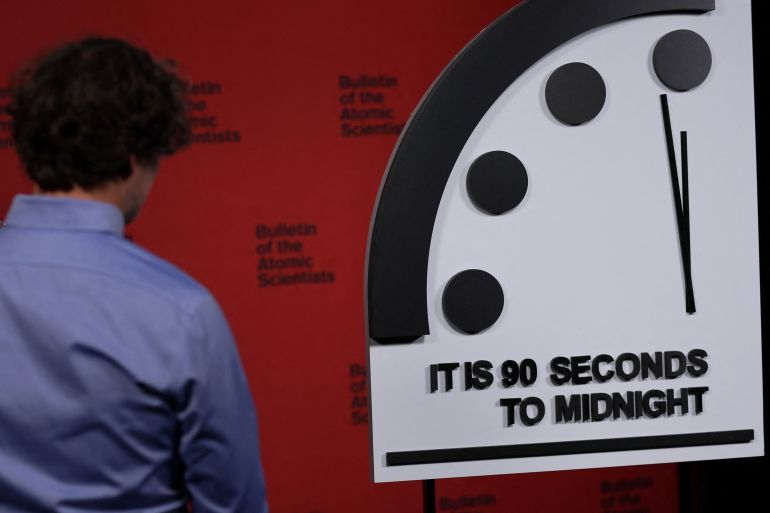Symbolic Doomsday Clock moves closer to midnight amid Ukraine war
Clock is now at 90 seconds to midnight as scientists warn of increased nuclear threats amid Russia’s invasion of Ukraine.

The metaphorical Doomsday Clock, a design tool used to symbolise how close humans are to extinction, has moved closer to midnight, signalling greater risks of nuclear war and other disasters that threaten life on Earth.
The Bulletin of the Atomic Scientists, an organisation that aims to “reduce man-made threats”, announced the annual doomsday warning on Tuesday, placing the clock’s hands at 90 seconds before midnight — the closest it has ever been. The organisation said the update was made “largely (though not exclusively) because of the mounting dangers of the war in Ukraine”.
Keep reading
list of 3 itemsPhotos: Graves sink, fisheries shrink as climate change hits Fiji
Medvedev warns of nuclear war if Russia defeated in Ukraine
Every year, the clock is adjusted, and the latest change places its hands 10 seconds closer to midnight than it was at the same time in 2022, when the Bulletin had announced its annual assessment weeks before Russia’s invasion of Ukraine.
Russia, a nuclear power, launched a war against its neighbour in February of last year, and the conflict continues to rage on. Western powers, including nuclear-armed countries, have been providing conventional military support to Ukraine.
Since the violence broke out, top Russian officials — including President Vladimir Putin — have alluded to the risk of nuclear war as Moscow faced military setbacks.
“Russia’s thinly veiled threats to use nuclear weapons remind the world that escalation of the conflict by accident, intention or miscalculation is a terrible risk,” Bulletin President Rachel Bronson said on Tuesday.
“The possibilities that the conflict could spin out of anyone’s control remains high.”
While Washington has said that there is no imminent threat of nuclear weapons use in Ukraine, United States President Joe Biden warned in October of a possible “Armageddon” if atomic arms are deployed.
On Tuesday, Steve Fetter, an academic and member of the Bulletin’s board, said the possibility of nuclear escalation in Ukraine cannot be ruled out.
“Accidents, mistakes and miscalculations could lead to unintended escalation, and Putin might deliberately escalate if faced with the prospect of defeat,” Fetter said.
He highlighted other nuclear risks, including increased ballistic missile tests in North Korea and the failure to resurrect the Iran nuclear deal, which would have seen Iran dismantle part of its nuclear programme. Fetter also pointed to moves by the US, China, Russia, India and Pakistan to modernise their nuclear forces.
“From almost every perspective, the risk of nuclear catastrophe is higher today than last year,” Fetter added.
The Doomsday Clock was created in 1947 by the Bulletin, which was founded two years earlier by scientists Albert Einstein, J Robert Oppenheimer and Eugene Rabinowitch and University of Chicago scholars.
The farthest the clock has been from midnight was 17 minutes. That was in 1991 when US President George HW Bush and his Soviet counterpart Mikhail Gorbachev signed the Strategic Arms Reduction Treaty (START) to reduce the number of nuclear weapons and ballistic missiles.
The Bulletin also weighs factors beyond nuclear threats. On Tuesday, it underscored biological dangers posed by viruses, as the world continues to deal with the COVID-19 pandemic, and the increasing toll of climate change.
Sivan Kartha, a scientist and Bulletin board member, said 2022 saw extreme weather events related to the climate crisis, including devastating floods, droughts and record temperatures across the world.
“With emissions still rising, weather extremes continue and are even more clearly attributable to climate change,” Kartha said.
The Bulletin said in its announcement on Tuesday that the war in Ukraine increased global threats beyond the immediate conflict by hindering international cooperation and undermining global norms.
“Russia’s invasion of Ukraine has increased the risk of nuclear weapons use, raised the specter of biological and chemical weapons use, hamstrung the world’s response to climate change, and hampered international efforts to deal with other global concerns,” Bulletin said in a statement.
“The invasion and annexation of Ukrainian territory have also violated international norms in ways that may embolden others to take actions that challenge previous understandings and threaten stability.”